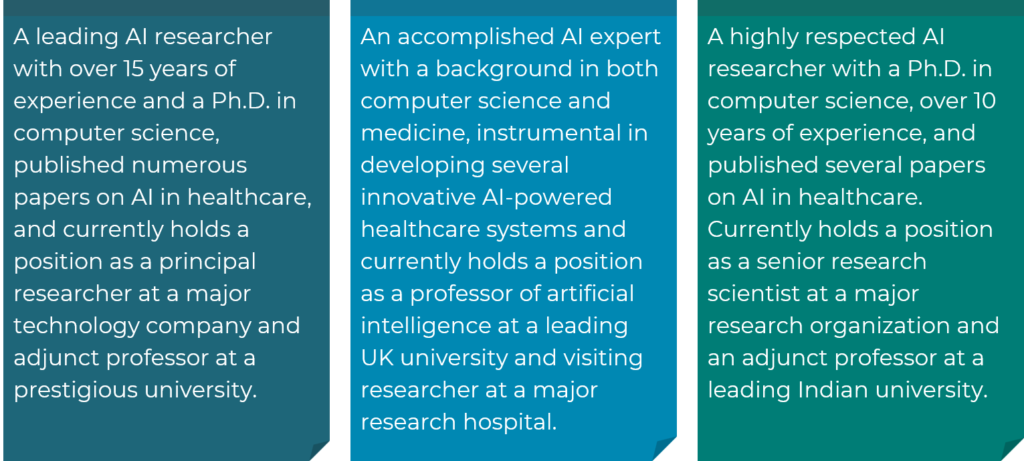Author: Biraj Ganguly | EVP – Healthcare and Life Sciences
The opportunity for AI in Healthcare
In recent years, the healthcare industry has begun to recognize the potential of artificial intelligence (AI) to transform the way care is delivered and improve patient outcomes. From automating tedious tasks to providing personalized care, the possibilities of AI in healthcare are vast. But despite the excitement surrounding this technology, its adoption in the healthcare sector has been slow.

Digital health records and increased access to patient information through smartphones and other devices have led to more automation and analytics in traditional hospitals and primary care offices. However, these applications have mainly been limited to scheduling appointments, reading medical notes, and maintaining patient records. Other areas such as image analysis, chatbots, and wearable devices for monitoring chronic conditions have yet to see widespread adoption.
Talking to the experts
To gain a deeper understanding of the current state of AI in healthcare and the barriers to its implementation, the Healthcare and Life Sciences team at Phronesis spoke with experts in the field. Through these conversations, they discovered that while the potential of AI in healthcare is undeniable, there are still significant challenges to overcome before it can be fully realized.

Key adoption challenges
- Regulatory environment: The healthcare industry is known for its complex regulatory and compliance obligations, with various stakeholders being highly conservative in their approach to new technologies and innovations. With the underlying data for AI tools being patient information, the rules and guidelines governing its use in medical treatment and research are particularly strict.
- Privacy concerns: Patients may have reservations about sharing their medical data for AI-based solutions, which can hinder the implementation of these technologies.
- Lack of expertise: Healthcare providers may not have the necessary knowledge and skills to implement and utilize AI-based solutions, and even developers may lack an understanding of healthcare systems. Additionally, AI algorithms require a deep understanding of medical knowledge to accurately diagnose diseases, which can be difficult to achieve with existing technologies.
- Limited data availability: AI algorithms require large amounts of data for learning and making accurate predictions. However, healthcare data is often scattered across multiple systems and can be incomplete, making it challenging to train AI algorithms. Furthermore, training models on single-payer systems in advanced economies may lead to a lack of inclusiveness and equity, resulting in inaccurate results and a lack of trust in AI-based solutions.
- High cost of deployment: The deployment of AI in healthcare systems can be expensive and requires significant investments in hardware, software, and staff training. This can be a significant barrier to adoption, particularly for smaller healthcare organizations with limited budgets. Furthermore, the cost of maintaining and updating the systems can also be high, adding to the overall financial burden.

AI in practice – success factors
To further understand these challenges, we analysed several ambitious projects in healthcare that sought to utilize AI, including Google’s DeepMind Health, IBM Watson’s Oncology Expert, Babyscripts, and iCancer. Despite significant investment and effort, these ventures ultimately fell short of their goals. The main reasons cited were issues with privacy, a lack of trust from healthcare professionals, and difficulty in integrating the technology into existing healthcare systems. Failure of at least 3 out of 5 may sound discouraging, however, there have been several successful examples as well. Such as Enlitic, Smart Medical Systems, Zephyr Health, and PathAI.
One of the key factors that sets successful AI products apart from those that fail is extensive research on data privacy and security measures. Data security and privacy are critical concerns for the healthcare industry and companies must ensure that their technology is compliant with industry standards and regulations. This not only helps to build trust with healthcare professionals, but it also helps to mitigate the risk of data breaches and other privacy-related issues.
Another important success factor is transparent communication and collaboration with healthcare professionals. Building trust with healthcare professionals is crucial for the success of any AI project. Companies must ensure that healthcare professionals are engaged and informed throughout the development process to ensure that the technology meets their needs and addresses their concerns.
Finally, successful AI products focus on specific therapeutic areas to provide specialized solutions and services. By focusing on specific areas, companies can tailor their solutions to meet the unique needs of the healthcare industry and provide specialized services that can improve patient outcomes.

In conclusion
Investing in research and addressing potential challenges before introducing new technologies into the healthcare industry is critical for the success of AI products. Companies must conduct thorough research, build trust with healthcare professionals through transparent communication and collaboration, and focus on specific therapeutic areas to provide specialized solutions and services. These insights serve as valuable lessons for companies looking to enter the healthcare AI space, as they provide a roadmap for success in this highly competitive field.


